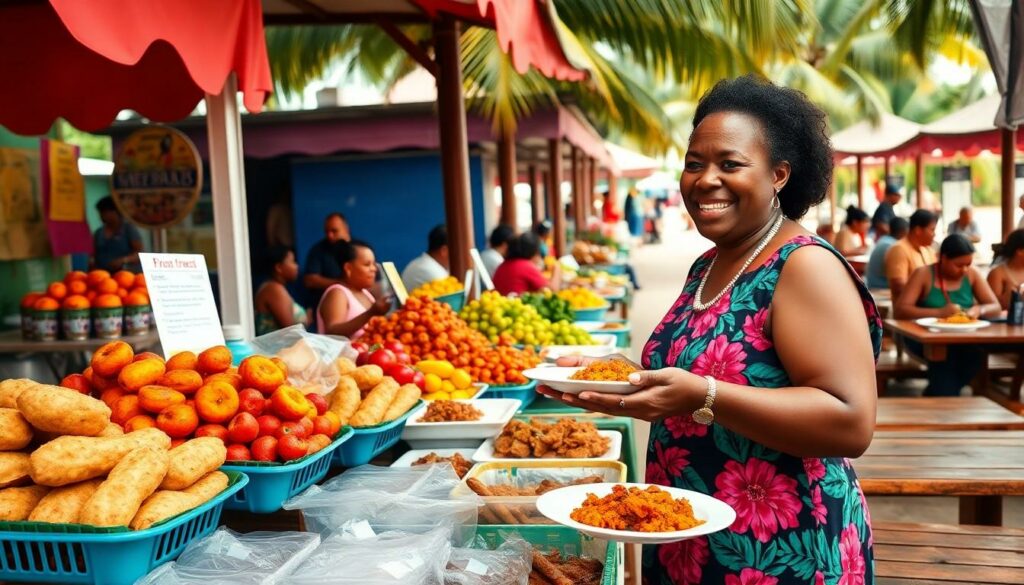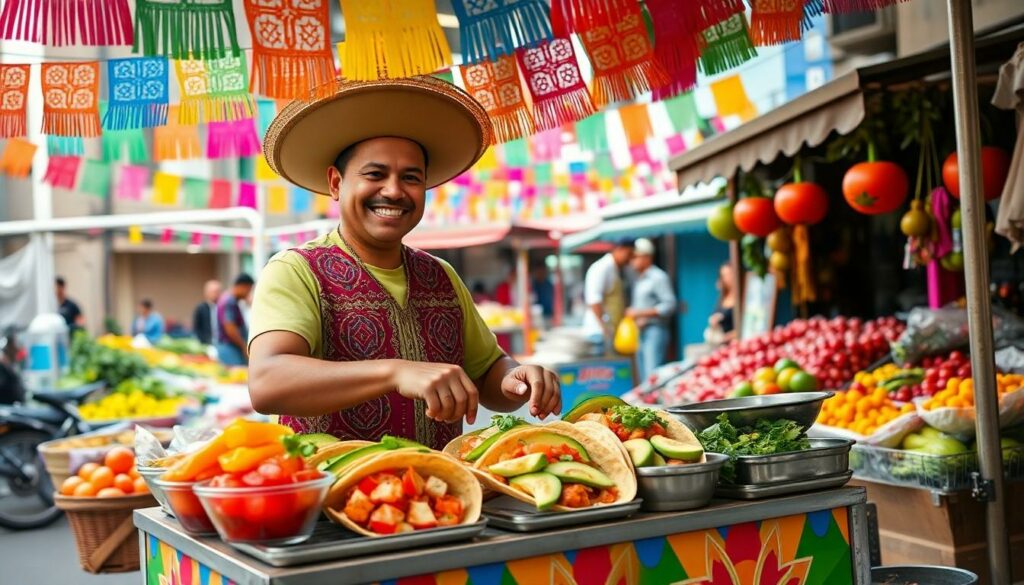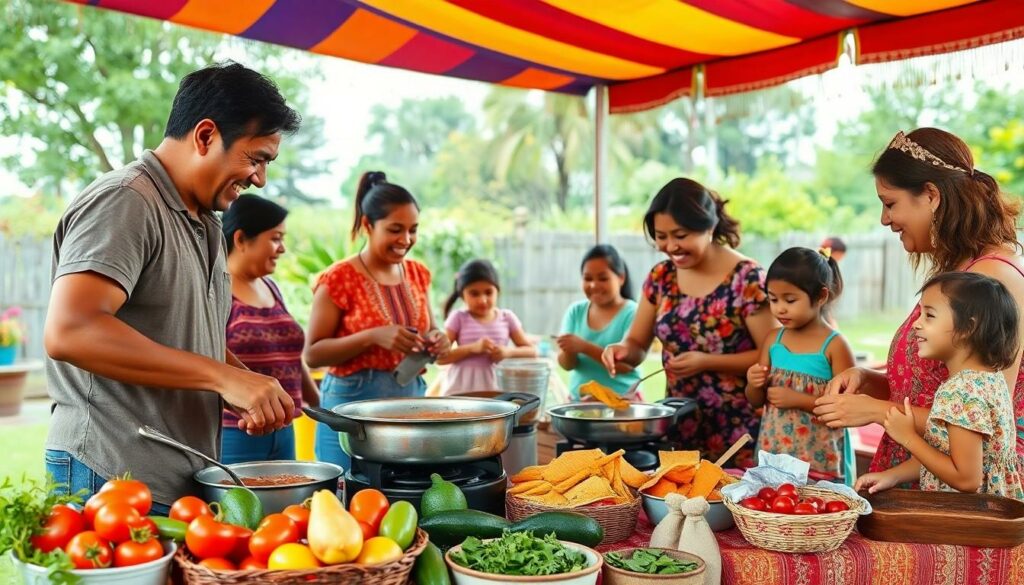In the Bahamas, food isn’t just sustenance; it’s a vibrant celebration of culture, history, and a dash of island flair. Picture this: fresh conch fritters sizzling in the sun, the tantalizing aroma of jerk chicken wafting through the air, and a refreshing rum punch that could make even the grumpiest beachgoer crack a smile. The Bahamas serves up a culinary experience that’s as colorful as its turquoise waters.
Bahamas Food Culture
Bahamas food culture reflects the islands’ vibrant heritage and diverse influences. Traditional ingredients often include seafood, tropical fruits, and spices. Conch, a local delicacy, appears in various forms, such as conch fritters and conch salad. Fresh fish also plays a critical role, with dishes like grilled grouper and snapper enjoyed by locals and tourists alike. The influence of African, European, and Caribbean cuisines is evident in Bahamian dining. Jerk chicken, a beloved dish, showcases a spicy combination of flavors. Additionally, peas and rice provide a hearty, comforting side that complements many meals.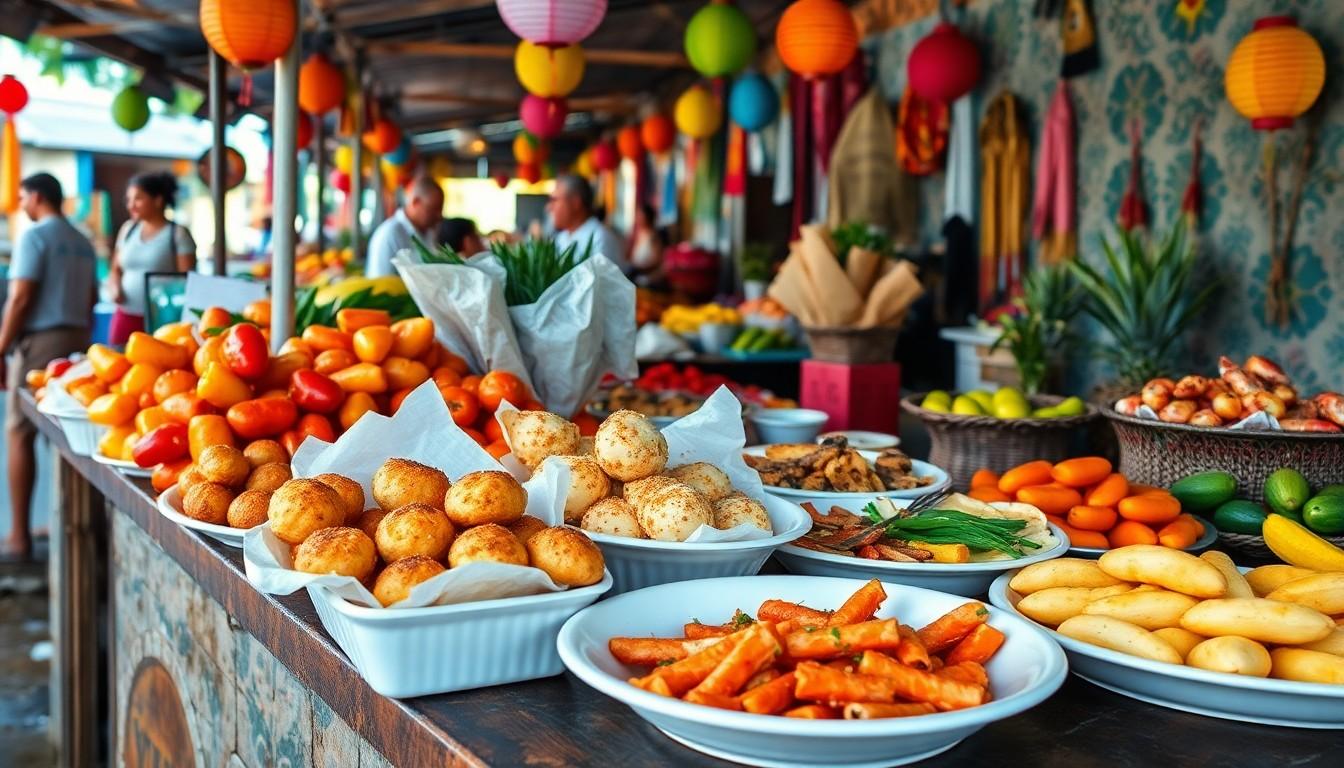 Celebrations often center around food, showcasing the communal aspect of Bahamian culture. Events like the Junkanoo festival feature food stands offering local favorites, creating a lively atmosphere. Rum punch, a popular beverage, adds to the festive environment, refreshing attendees as they enjoy traditional music and dancing.
Markets abound with fresh produce and ingredients, allowing chefs to create vibrant dishes. Local culinary practices emphasize using seasonal ingredients, ensuring that flavors remain fresh and relevant. Cultural pride is evident when residents gather for family meals, which often include a mix of personal recipes passed down through generations.
Culinary tours now attract visitors eager to experience authentic Bahamian flavors. Food festivals celebrate local chefs and showcase innovative takes on traditional recipes. Exploring the Bahamas through its food uncovers the islands’ unique spirit, inviting everyone to partake in the rich tapestry of flavors and cultural significance.
Celebrations often center around food, showcasing the communal aspect of Bahamian culture. Events like the Junkanoo festival feature food stands offering local favorites, creating a lively atmosphere. Rum punch, a popular beverage, adds to the festive environment, refreshing attendees as they enjoy traditional music and dancing.
Markets abound with fresh produce and ingredients, allowing chefs to create vibrant dishes. Local culinary practices emphasize using seasonal ingredients, ensuring that flavors remain fresh and relevant. Cultural pride is evident when residents gather for family meals, which often include a mix of personal recipes passed down through generations.
Culinary tours now attract visitors eager to experience authentic Bahamian flavors. Food festivals celebrate local chefs and showcase innovative takes on traditional recipes. Exploring the Bahamas through its food uncovers the islands’ unique spirit, inviting everyone to partake in the rich tapestry of flavors and cultural significance.
Historical Influences On Bahamian Cuisine
Bahamian cuisine showcases a rich tapestry woven from diverse historical influences. These elements contribute significantly to the islands’ unique food culture.Indigenous Ingredients
Indigenous ingredients play a crucial role in Bahamian dishes. Native peoples utilized local resources, harvesting seafood, fruits, and vegetables. Spices such as peppers and wild herbs enhanced flavor profiles in traditional meals. Conch stands out as a key ingredient, appearing in various forms like fritters and chowder. Additionally, tropical fruits, including guava and mango, brought sweetness and color to the local diet. Understanding these ingredients captures the essence of Bahamian heritage, reflecting the islands’ natural bounty.Colonial Impact
Colonial influences transformed Bahamian cuisine, integrating flavors and techniques from different cultures. British colonists introduced baking, leading to dishes like meat pies and biscuits. African culinary practices enriched the islands, bringing in methods for seasoning and cooking. Spanish explorers left their mark with ingredients such as olives and citrus fruits. Caribbean traditions merged with local practices, evident in jerk chicken and spicy seafood stews. These colonial influences diversified the food landscape, creating a culinary heritage that celebrates the islands’ history.Traditional Dishes Of The Bahamas
Bahamian cuisine showcases a variety of traditional dishes that reflect the islands’ rich cultural tapestry. These dishes often highlight fresh, local ingredients and unique flavors.Conch: The Heart Of Bahamian Cuisine
Conch serves as a vital ingredient in Bahamian cooking. This versatile shellfish appears in various forms, including conch fritters, conch salad, and cracked conch. Locals cherish the dish for its unique texture and mild flavor. The preparation methods vary, enhancing its appeal. Famous for its freshness, conch is often caught daily and served in restaurants across the islands. Cultural significance is seen through its presence in food festivals and celebrations, making it a beloved staple for residents and visitors alike.Peas And Rice: A Culinary Staple
Peas and rice has become a staple in Bahamian households. This dish combines pigeon peas or black-eyed peas with rice, often cooked in coconut milk and flavored with spices. Served as a side dish, it complements many main courses, enriching the overall dining experience. Celebrations frequently showcase this dish, symbolizing togetherness and family. Variations can include the addition of meats or vegetables, enhancing its flavor profile. Culinary traditions celebrate peas and rice, making it a must-try when exploring Bahamian cuisine.Contemporary Bahamas Food Scene
The contemporary food scene in the Bahamas reflects a blend of tradition and innovation. Culinary creativity thrives, with chefs pushing boundaries while honoring local ingredients.Fusion Of Flavors
Fusion cuisine has taken hold in the Bahamas, combining elements from various cultures. Caribbean spices often blend with Mediterranean techniques, creating unique dishes. A popular example involves conch being prepared with Asian flavors, resulting in dishes like conch sushi rolls. Tropical fruits frequently appear in savory dishes, adding sweetness and freshness. Diners can enjoy jerk chicken tacos that marry jerk spices with traditional Mexican influences. This delightful mix showcases the islands’ culinary evolution, offering something for everyone.Popular Restaurants And Eateries
Numerous restaurants celebrate Bahamian culinary heritage while introducing modern twists. Fish Fry in Arawak Cay remains a favorite, known for its casual atmosphere and delicious conch fritters. Graycliff Restaurant, a fine dining establishment, impresses with gourmet Bahamian dishes and extensive wine selections. The Poop Deck provides stunning waterfront views along with seafood favorites like grilled lobster. For a more local experience, Montagu Gardens serves traditional meals that epitomize Bahamian comfort food. These eateries attract locals and tourists alike, making them integral to the vibrant food culture.Festivals Celebrating Bahamian Food
Festivals serve as vibrant showcases of Bahamian culinary culture. The Junkanoo festival stands out, offering a feast for the senses with local food stalls featuring favorites like conch fritters and jerk chicken. These festivities create an atmosphere filled with celebration and togetherness. One notable event is the Bahamas Junkanoo Festival, celebrated during several holidays. Participants display traditional foods alongside lively parades, drum music, and colorful costumes. This festival exemplifies how gastronomy intertwines with local traditions and celebrations.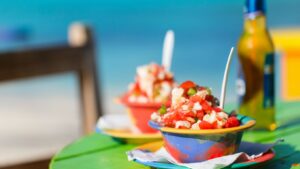 Culinary enthusiasts also enjoy the annual Bahamas Food and Wine Festival. This event highlights local and international chefs showcasing diverse flavors and innovative dishes that reflect Bahamian cuisine. Educational workshops during the festival provide insights into cooking techniques and ingredient sourcing, enriching visitors’ culinary knowledge.
Local fish fries offer a more casual dining experience, popular among both residents and tourists. Establishments like Arawak Cay come alive with fresh seafood options and signature drinks. Here, experiencing authentic local flavors in a laid-back setting resonates with visitors seeking a taste of island life.
Community celebrations further emphasize the importance of food in Bahamian culture. Harvest festivals feature seasonal ingredients that highlight the connections between food, family, and cultural identity. Sharing dishes during these events fosters a sense of unity and pride in the islands’ heritage.
Bahamian food festivals invite everyone to savor unique flavors while immersing themselves in the warm, welcoming spirit of the islands. Attendance at these events allows individuals to appreciate the rich culinary landscape and the diverse influences that shape Bahamian food culture.
Culinary enthusiasts also enjoy the annual Bahamas Food and Wine Festival. This event highlights local and international chefs showcasing diverse flavors and innovative dishes that reflect Bahamian cuisine. Educational workshops during the festival provide insights into cooking techniques and ingredient sourcing, enriching visitors’ culinary knowledge.
Local fish fries offer a more casual dining experience, popular among both residents and tourists. Establishments like Arawak Cay come alive with fresh seafood options and signature drinks. Here, experiencing authentic local flavors in a laid-back setting resonates with visitors seeking a taste of island life.
Community celebrations further emphasize the importance of food in Bahamian culture. Harvest festivals feature seasonal ingredients that highlight the connections between food, family, and cultural identity. Sharing dishes during these events fosters a sense of unity and pride in the islands’ heritage.
Bahamian food festivals invite everyone to savor unique flavors while immersing themselves in the warm, welcoming spirit of the islands. Attendance at these events allows individuals to appreciate the rich culinary landscape and the diverse influences that shape Bahamian food culture.
